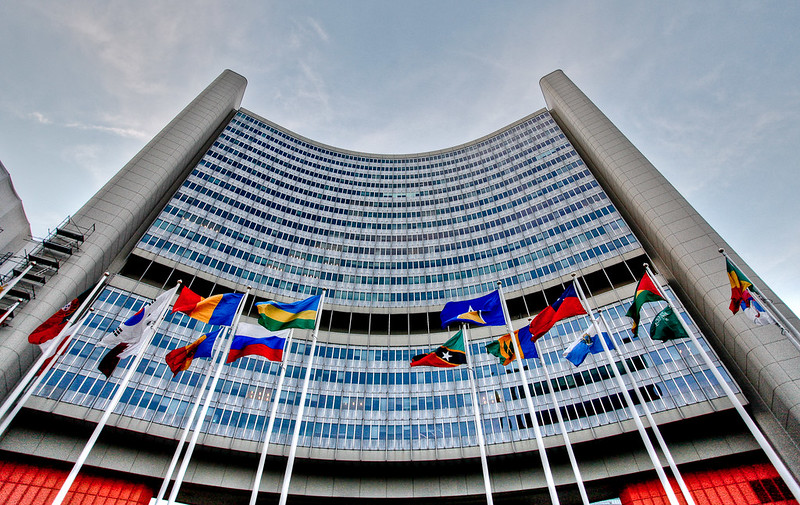 Vienna International Centre (Image Credit: Rodolfo Quevenco/IAEA)
Vienna International Centre (Image Credit: Rodolfo Quevenco/IAEA)
Will the IAEA Nuclear Law Conference Restart the Obama Nuclear Summits?
The International Atomic Energy Agency (IAEA) has announced that it will host the first International Conference on Nuclear Law in February of 2022 (ICNL 2022) at its headquarters in Vienna, Austria. The event is expected to draw many scholars and practitioners from around the world to discuss the complex field of nuclear law. Nuclear law underpins the safe and secure use of nuclear technology and goes hand in hand with addressing issues of international nuclear security. Topics will range from treaties on the security of nuclear power plants to the verification of nations’ nuclear non-proliferation commitments.
Conferences such as this one are paramount to the progression of nuclear security across the globe. Diminished attention to nuclear security over the past several years has been a result of a lack of leadership on the issue. Hopefully, the ICNL 2022 will spark a new round of nuclear security summits like the ones that proved to be successful under former President Obama. A total of four nuclear security summits were held while Obama was in office, each one building upon the progress of the last. ICNL 2022 will build momentum in the nuclear security sector that President Biden can use to restart the summit process and expand on key issues outlined by the previous summits.
Nuclear Terrorism and Loose Material
Washington D.C. hosted the first Nuclear Security Summit (NSS) in April 2010 and laid the groundwork for a series of summits focused on the issue of nuclear terrorism. The first summit concluded with a communiqué that affirmed a commitment to reducing “loose” nuclear material around the globe in hopes of keeping it out of the hands of terrorists. In the 8 years after the first summit, the vast majority of nations possessing nuclear material made progress in securing or reducing their stores; Obama himself claimed a figure of 3.8 tons of nuclear material secured or removed from 30 countries. However, this effort has stagnated since 2018 and major security gaps in the management of materials still exist, which makes this issue just as relevant today as it was 11 years ago. President Biden and the international community at large must deal with the continued presence of extremists around the globe and work to mitigate the risk of nuclear material falling into the wrong hands.
Nuclear Information Security
Two years later, the second NSS hosted in Seoul resulted in a multinational statement, this time utilizing the phrase “nuclear information security.” Nuclear information security refers to the safekeeping of technical know-how on the development of nuclear weapons and fissile material. Future goals were not clearly laid out, rather, it focused on accomplishments made thus far and reaffirmed commitments from the first summit. Perhaps there is difficulty in defining exactly what progress in this field looks like, a task that ICNL 2022 could take on directly as it ventures to discuss the future development of nuclear law. Nuclear information security seems especially relevant today as Iran has continued to enrich uranium beyond that of civilian use and may build its own significant stores of highly enriched uranium.
International Cooperation
In 2014, the third NSS, hosted in the Hague, reaffirmed commitments made in 2010 and 2012 while also emphasizing the need for continued international cooperation in the field of nuclear security. The communiqué specifically recognized the IAEA as playing the central role in the international nuclear security architecture. The fourth and final NSS, hosted in Washington D.C. in 2016, was an opportunity to showcase the various successes, including the more than 30 nations that updated national laws to reflect their commitments made throughout the NSS process.
By bringing together hundreds of nuclear security professionals from around the world, the spirit of the NSS collaborative process is being reinvigorated. The ICNL 2022 is an opportunity to get the ball rolling once again and continue to make breakthroughs. Although it will not host world leaders and lead to national commitments like the Nuclear Security Summits, collaboration between nuclear security professionals is integral to the development of policy standards that can be brought to the state level for implementation. The Biden administration should see this as an opportunity to restart the summit process and provide the global leadership that makes continued advancements in the field of nuclear security possible.
Image licensing: Building E | Building E of the Vienna International Centre h… | Flickr





